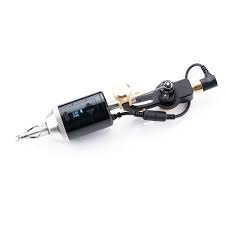The Art of Tattooing: A Deep Dive into the World of Tattoo Guns and Supplies
Tattooing is not just a form of body art; it is a profound expression of individuality, culture, and creativity. As the popularity of tattoo equipment continues to rise, so does the demand for high-quality tattoo supplies and equipment. Among the most essential tools in a tattoo artist's arsenal is the tattoo gun. In this blog, we will explore the intricacies of tattooing, the importance of using the right tattoo supplies, and how Inkclaw stands out in this vibrant industry.

Tattooing is not just a form of body art; it is a profound expression of individuality, culture, and creativity. As the popularity of tattoo equipment continues to rise, so does the demand for high-quality tattoo supplies and equipment. Among the most essential tools in a tattoo artist's arsenal is the tattoo gun. In this blog, we will explore the intricacies of tattooing, the importance of using the right tattoo supplies, and how Inkclaw stands out in this vibrant industry.
Understanding the Tattoo Gun
A tattoo gun, also known as a tattoo machine, is a device that uses a needle to inject ink into the skin. The mechanism of a tattoo gun is relatively simple, yet it requires a skilled hand to create intricate designs. There are two main types of tattoo guns: coil and rotary.
Coil Tattoo Guns
Coil tattoo guns are the traditional machines that have been used for decades. They operate using electromagnetic coils to move the needle up and down. Artists often prefer coil machines for their versatility and the ability to customize them for different styles of tattooing. However, they can be heavier and require more maintenance than their rotary counterparts.
Rotary Tattoo Guns
Rotary tattoo guns use a motor to drive the needle, making them quieter and lighter than coil machines. They are often favored for their smooth operation and reduced vibration, which can lead to less fatigue for the artist during long sessions. Many artists find rotary machines easier to use for detailed work, making them a popular choice in modern tattoo studios.
The Importance of Quality Tattoo Supplies
When it comes to tattooing, the quality of tattoo supplies can make a significant difference in the final outcome. Using subpar materials can lead to poor results, including fading, blurring, and even infections. Here are some essential tattoo supplies that every artist should consider:
Tattoo Inks
The ink used in tattooing is crucial for achieving vibrant and long-lasting designs. High-quality inks are formulated to be safe for the skin and provide a wide range of colors. Artists should always choose inks that are compliant with health regulations and free from harmful substances.
Needles
Tattoo needles come in various sizes and configurations, each designed for specific techniques. For instance, single needles are often used for fine lines, while groupings of needles are used for shading and coloring. Investing in high-quality needles is essential for both the artist's performance and the client's safety.
Power Supply
A reliable power supply is vital for the operation of a tattoo gun. It provides the necessary voltage and current to ensure consistent performance. Artists should look for power supplies that offer adjustable settings, allowing them to customize the output based on their specific needs.
Hygiene Supplies
Maintaining a sterile environment is paramount in tattooing. This includes using disposable gloves, sterilizing equipment, and having proper waste disposal methods in place. Quality hygiene supplies not only protect the artist but also ensure the safety of the client.
The Role of Technology in Tattooing
As technology advances, so does the tattooing industry. New innovations in tattoo supplies and equipment have made the process more efficient and safer. For example, digital tattoo guns now come equipped with features that allow artists to adjust settings with precision, track their usage, and even connect to apps for better workflow management.
Digital Design Tools
Before the needle ever touches the skin, artists often use digital design tools to create and refine their tattoo concepts. Software programs allow for intricate designs to be crafted and modified easily, ensuring that the final product meets the client's expectations. This technology has revolutionized the way artists approach their work, making it easier to visualize and plan complex tattoos.
Social Media and Online Portfolios
In today's digital age, social media plays a significant role in how tattoo artists showcase their work. Platforms like Instagram and TikTok allow artists to reach a broader audience, share their portfolios, and connect with potential clients. This visibility can lead to increased business opportunities and collaborations within the industry.
The Importance of Education and Training
While having the right tattoo supplies is essential, the most critical factor in becoming a successful tattoo artist is education and training. Aspiring artists should seek out reputable schools or apprenticeship programs that provide hands-on experience and knowledge about the art and science of tattooing.
Understanding Skin Anatomy
A thorough understanding of skin anatomy is crucial for any tattoo artist. Knowing how the skin reacts to needles and ink can help artists make informed decisions about their techniques and the types of tattoo supplies they use. This knowledge can also aid in preventing complications and ensuring the longevity of the tattoo.
Mastering Techniques
professional tattoo supplies is an art form that requires practice and mastery of various techniques. From line work to shading and color blending, each aspect of tattooing demands skill and precision. Artists should dedicate
What's Your Reaction?
















.jpg)
.jpg)


